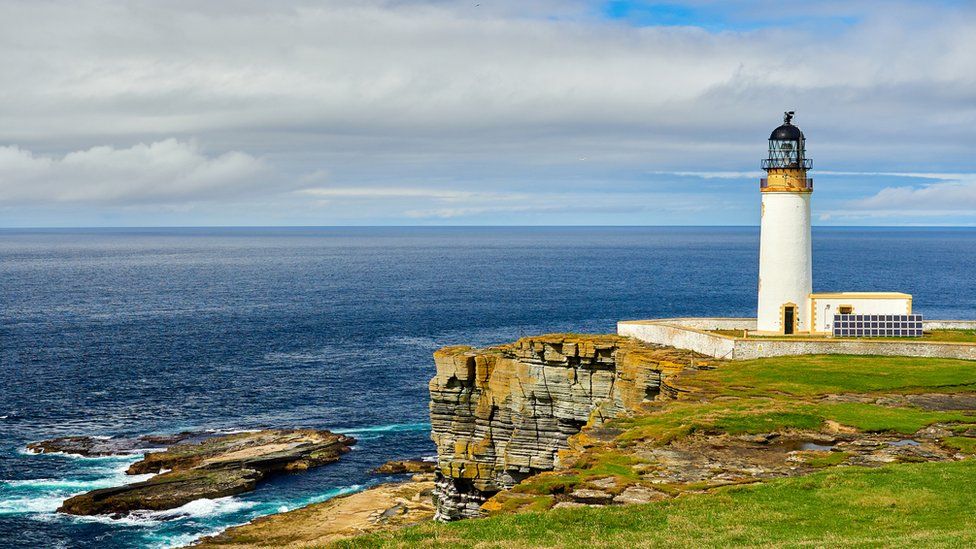
A gene variant which is known to increase the risk of breast and ovarian cancer has been identified in people with Orkney heritage.
A new study suggests one in 100 people with grandparents from Orkney has a specific mutation of the BRCA1 gene.
It found that most of them could trace their family ancestry back to the island of Westray.
It is believed to be the first time a geographic ancestral link of this kind has been made within the UK.
The researchers also discovered the specific Orkney gene variant in smaller numbers in genetic testing across the UK and even in the US.
Previous research has found that women from certain ethnic backgrounds, such as Ashkenazi Jews, also have a high rate of a specific BRCA gene variant.
Across the UK about 1 in 1,000 people have a BRCA1 mutation, which can leaves women at a higher risk of ovarian and breast cancer.
The BRCA genes are present in every person, both men and women, but when a fault occurs in one of them it can result in DNA damage and lead to cells becoming cancerous.
People with a genetic variant have a 50% chance of passing it on to their children.
Awareness of the faulty gene was raised a decade ago when Hollywood actress Angelina Jolie underwent a double mastectomy after discovering she had a BRCA1 variant.
The operation was said to reduce her chances of getting breast cancer from 87% to 5%.
However the NHS advises that risk-reducing surgery is not the only option.
It also advises awareness of changes to breasts, annual breast screenings and MRI scans can help detect breast cancer.
Analysis by Laura Goodwin, BBC Scotland Science and Innovation Correspondent
Identifying this variant - BRCA1 V1736A - is the result of 25 years of clinical research by Prof Zosia Miedzybrodzka, the director of the NHS Grampian Clinical Genetics service.
Back then the breast cancer screening centre started to detect an increase in the number of families they were seeing and wanted to know why.
As genetic testing grew, the team saw the same gene variant appearing time after time and became suspicious of its significance.
Speaking to patients about their ancestry helped make the link to Westray, an outer Orkney island with a population of just 600.
BRCA1 V1736A is likely to have arisen in a founder individual from Westray at least 250 years ago.
So far 37 women of Orcadian heritage with the variant have been identified.
Some won't ever go on to develop cancer but others have chosen to have risk-reducing surgery.
There are 20 people found to have the gene variant who don't yet know they carry it.
They were among more than 2,000 volunteers who gave genetic data to the Orcades (Orkney Complex Disease Study) study.
The design of the study at the time meant information would not be disclosed.
The team behind it have now asked the Research Ethics Committee for permission to contact the women identified to tell them they have the BRCA1 gene variant.
'It is important that we know'
Former nurse Linda Hagan was born on Westray and has lived there most of her life.
Her parents and grandparents and most of her ancestors were also from the island.
Linda, 69, told the BBC that her younger sister died of breast cancer four years ago.
She should get the results of her genetic screening shortly.
Linda has three daughters and said it would be tough to think she might have passed the gene variant to them.
"But it is important that we know and hopefully something can be done about it," she said.
Grandparents from Westray
The latest research from the Universities of Aberdeen and Edinburgh was published in the European Journal of Human Genetics.
The study looked back at the 80 grandparents of the BRCA1 variant carriers identified in the Orcades genetic study and found 60% were from Westray.
Further ancestral links to the island went back to the early 18th century.
The Orkney population is just 22,000 but there are people with a shared ancestry around the world and the researchers said they should be offered a targeted test for the variant.
Currently in Scotland the test is available to those who know of a direct family connection to the gene or have a history of ovarian or breast cancer in their family.
Planning is under way for a small pilot trial that will offer testing to anyone living in Westray with a Westray-born grandparent, regardless of a family history.
If the pilot is successful, the long-term aim is to offer the test to everyone in Scotland with a Westray-born grandparent who wants it.
NHS Grampian genetics clinic is running a helpline for queries about the gene variant linked to breast and ovarian cancer for those who have grandparents from Orkney. The number to call is 01224 553940. Email inquiries can be directed to gram.orkBRCAgene@nhs.scot
GPs will not be able to assist with gene testing and any questions about this research and next steps should be directed to the helpline.
Related Topics
-
- 12 January 2018
-
- 14 March 2018
-
- 14 May 2013
-
- 1 December 2014
-
- 3 July 2019
from Via PakapNews